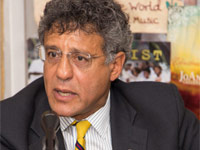 Workers hired on a contractual basis to disconnect and reconnect accounts have been earning as much as $95,000 a year, Leslie Miller, The Bahamas Electricity Corporation’s (BEC) executive chairman said .
Workers hired on a contractual basis to disconnect and reconnect accounts have been earning as much as $95,000 a year, Leslie Miller, The Bahamas Electricity Corporation’s (BEC) executive chairman said .
“When I took over as chairman I said that I wanted to see all the contracts that BEC has on the table,” Mr Miller said.
“I was getting at a situation where BEC had hired some contractual workers to reconnect and disconnect. Regular guys who just need a car. They train you for one week and you go on the road.
“Ten persons were hired on contractual arrangements, even though BEC had their own crew. I asked to see what we were paying those guys. It was $10 to disconnect, $5 to reconnect, and $10 to pick up a cheque.”
Mr Miller added: “Eventually I got the figures on what we were paying these guys. We pay $300 for the training. One guy for the first week averaged $1,900. Another guy averaged $1,500, another $1,600 and another $1,800. Some of the guys got smart and said they wanted to go out east and west, where they have a a lot of apartments.
“The next month, same crew, the guys averaged $2,195, $2,300, $2,595, $2,700, $2,600 and this is one week. The following week it was $2,750, $2,850, $2000, $2,200. The yearly figures are $95,000 for one, $86,000 for another, $73,000 for another guy, $66,000 for another another, and for another it was $67,000.
“That is giving you some idea as to why our bills are the way it is. How could a guy, who is cutting off your light, make $96,000 a year? The total for the 10 of them was $704,595.50.”
Mr. Miller said that he implemented a new system which subsequently allowed BEC to hire 22 unemployed persons full-time.
In The Tribune article Mr. Miller was further quoted: “Management didn’t even know what the figure was. I called them in and told them we will have a new scheme. Those who turn off 40 lights a day for five days will get $400, those who turn off 50 lights a day for five days get $500, and those who turn off 60 lights a day for five days get $600.
“So far, over the six-month period, BEC has saved $255,820.”
Source: The Tribune



